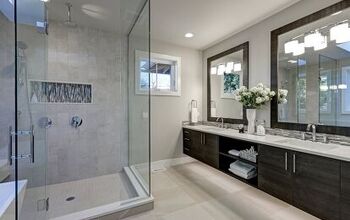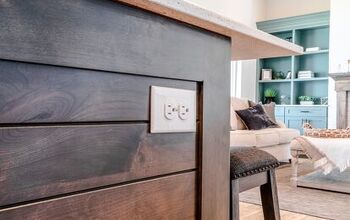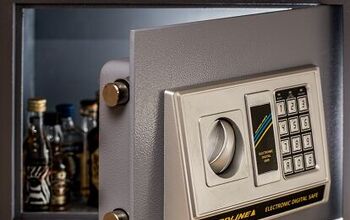How To Block A Neighbor's Security Camera (Secret Tip!)

Did you just discover that your neighbor’s security camera has a perfect view of your property? Before you panic, think about it logically. Chances are that your neighbor wants to keep their property safe and doesn’t realize it’s pointing at your property.
Install tinted windows, hang curtains, or plant tall hedges, shrubs, and trees to block the camera. Speak to your neighbor to tell them you’d prefer the camera is not pointed at your home. Install your security camera pointed into your neighbor’s yard to make a point or persuade them to move theirs.
In this article, we’ll discuss how to approach this tricky situation, and let you know what your rights are. Then we’ll guide you through a solution, and let you know what not do to in this scenario.
Do You Need Curtain Installation Services?
Get free, zero-commitment quotes from pro contractors near you.

Is it Illegal for a Neighbor to Point a Camera at Your Property?
Finding a security camera watching your property can be a disturbing discovery. But, before you confront your neighbor or attempt to destroy the camera, make sure you know the laws about it.
The truth is, under the right circumstances this can be perfectly legal. But several factors come into play when determining the legality of security cameras, such as state laws. Each state has its laws regarding the use of residential security cameras.
But there are a few things that are uniform throughout the country:
- Reasonable expectation of privacy: Federal law specifies that cameras cannot be pointed anywhere where there is an expectation of privacy. Therefore, if your neighbor’s camera is capturing the inside of your home, it’s infringing on your expectation of privacy.
- Public Spaces: Cameras that capture public spaces, or areas in public view, are mostly legal. For example, if your neighbor’s camera is recording the sidewalk and includes a portion of your yard, that’s probably legal. Similarly, if their camera view includes somewhere visible from the street, like your front or side yard, it’s probably okay.
- Audio Recording: In general, you cannot record audio of someone without their consent. So, if your neighbor’s camera is recording audio, it’s probably illegal. The only way to find out if your neighbor’s camera records audio is to ask, unfortunately.
How to Block your Neighbor’s Security Camera
Step 1: Is the Camera Real?
Before you rush to judgment, consider whether the camera is real, or even on. If your neighbor is worried about theft or trying to deter criminals, it’s possible that it could be a decoy. Using a fake camera is a cheap, effective way to scare away burglars.
You can usually tell whether a camera is real by looking for the infrared light. Most cameras have a red light that is visible especially at night. Also, check to see if there are any cables connected to the camera.
Step 2: Talk to Them
If you suspect that your neighbor’s security camera is invading your privacy, it’s always best to talk to them first. Chances are, they’re probably oblivious to the fact that their camera is on your property. They probably are trying to secure their home’s perimeters and didn’t consider the fact that your property is within view.
So, before you make any potentially harmful assumptions, just have a polite, non-accusatory chat with your neighbor. Ask them why the camera is in that position. Then, mention that the camera is pointed at your property.
Next, ask them if they could adjust the angle of the camera away from your property. If they insist that the camera can’t view your private areas, and you suspect they do, ask for footage. Seeing footage of what’s been recorded should be an easy way to settle this dispute.
If they refuse to provide their footage, it could be a sign that they’re not being truthful, but not necessarily. In this case, you can still simply ask them to divert the camera or angle it away from your property. If they refuse, end the conversation, and move on to the next step.
Step 3. Contact the Proper Authorities
If you aren’t sure whether your neighbor is lawfully recording you, consider contacting a lawyer. A lawyer will determine whether the camera is, in fact, illegally recording your property.
If, however, you know your neighbor’s camera is pointed directly into your private rooms inside the house, call the police. This behavior is unacceptable and needs to be reported immediately.
Step 4: Block the View
You can probably assume that even if your neighbor is recording illegally, the problem might not get resolved immediately. The authorities will need to take the time to determine whether your neighbor needs to divert their security camera. Police need to make sure they’re not violating your neighbor’s rights as well before they take action.
In the meantime, you’ll need to cover any private areas that you don’t want to be recorded. Make sure you have the shades closed, and thick curtains over the windows in question. Buying frosted glass for the windows to block the view is also a good method.
It couldn’t hurt to double up on your coverage. You can buy trees or shrubs that are already grown to block your windows or private areas.
Step 5: Install your Own Legal Security Camera System
This is one example where fighting fire with fire isn’t a bad idea. If your neighbor is recording your property and is not listening to reason, this could be a great wake-up call.
Make sure you read up on your local laws about security cameras first. Then set up your own, perfectly legal cameras. If your neighbor indeed has malicious intentions, seeing your camera should do the trick to curb this behavior.
How to Install Security Cameras Outside
Step 1: Create a Plan
Figure out how many cameras you’ll need, and where you want to angle your cameras. Consider whether you want cameras on entry doors, your deck, off-street windows, backyard, and driveway. Try to find spots for the cameras that are over 10 feet high, and where they will be protected from bad weather.
If you’re using a wired system, figure out where you’ll be drilling holes. You’ll need holes to connect the wires from the cameras to the DVR box inside.
Step 2: Prepare the Mount
Use the mounting template that comes with the security system kit to drill the mount in place. For a wired system, run your cables through the camera mount and the wall to the intended DVR box location. Repeat this with each camera mount.
Step 3: Install the Cameras
If the cameras require batteries, put the batteries in before mounting the cameras. If it’s a wired system, attach the cable from the wall to the camera. Then connect the camera to the power source, if applicable. Install the camera onto the mount and angle it in your preferred direction. Repeat for each camera.
Step 4: Make Connections/Install Software
For wireless camera systems, install the software that came with the device. The instructions should tell you exactly how to set this up.
For wired security cameras, connect the input cable to the DVR box. Then connect the output port of the DVR to the input slot of the monitor. Finally, make sure all the parts are connected to the power source.
What Not to Do
It’s important to know what solutions are off-limits. When perusing the internet for advice, you’ll likely find a lot of sketchy, questionable strategies to block cameras. Whether your neighbor’s security cameras are legal or not, several things are off-limits, such as:
- Cutting wires: This should be obvious. Tampering with any wires or cables on your neighbor’s camera crosses the line into the destruction of property. And if you’re reporting their illegal recording to the police, this will not help your case.
- Covering the lens: Blocking the lens with anything, like butter or even a cloth, is illegal. This also counts as meddling with your neighbor’s private property.
- Blinding the camera with light: You may have heard of, or seen on tv, people using laser pointers or LED lights to disrupt a camera. But this will not be effective for any length of time. You would have to keep the light at the perfect angle to block the lens, and the camera could move. Also, your neighbor will have evidence on video that you’re blocking his camera. He could easily use this to build up a case against you.
- Hacking into their system: Hacking, as you probably already know, is illegal. Although it’s pretty easy to hack into a neighbor’s security system, it’s equally as easy to get caught doing it. And what’s more, this won’t even stop their camera from recording.
- Jamming the signal: This is extremely hard to do and requires some advanced spy equipment. Not only that, but the use of signal jammers is decidedly illegal in the US.
Tampering with your neighbor’s camera in any way is not only illegal but most likely ineffective. If they’re legally recording, they’ll report you to the authorities and replace the cameras. If they’re illegally recording you, they’ll probably just replace them with more discreet cameras.
Do You Need Curtain Installation Services?
Get free, zero-commitment quotes from pro contractors near you.

Related Questions
How much do security cameras cost?
It’s possible to find outdoor security cameras for under $100. But the most durable, weather-resistant cameras will be closer to $200-300.
Can my neighbor record me with a phone on my property?
It depends. The law states that you can record on public property. If you’re standing in the front yard, your neighbor is recording the sidewalk and you’re in view, it’s probably legal. However, if he/she is doing it purposely to harass you, that’s not okay. It’s best to contact a lawyer or the police to find out the legality.

Kathryn is a craft aficionado who loves writing about DIY home improvement projects. When she's not writing, she loves reading, listening to musicals, and playing with her kids.
More by Kathryn Flegal



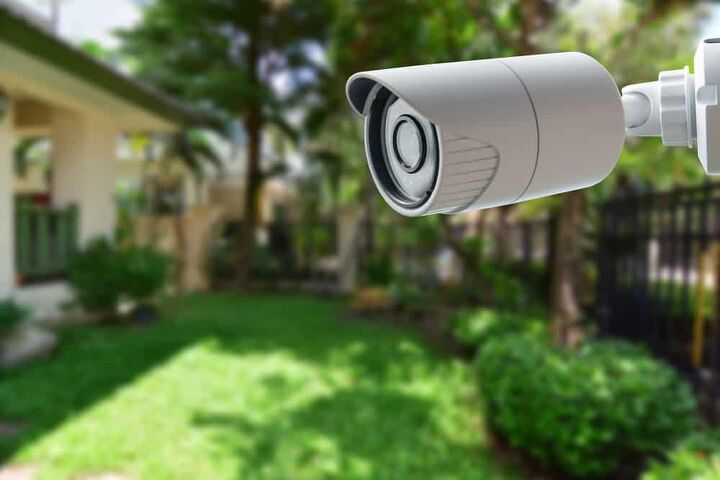






![10 Best Scroll Saws for 2022 [Ultimate Reviews & Buyer's Guide]](https://cdn-fastly.upgradedhome.com/media/2023/07/31/9070684/10-best-scroll-saws-for-2022-ultimate-reviews-buyer-s-guide.jpg?size=350x220)
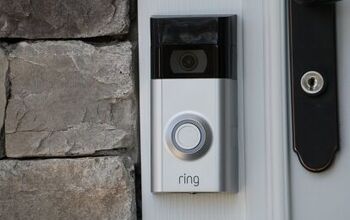
![10 Best Electric Lawn Mowers - [2022 Reviews & Top Rated Models]](https://cdn-fastly.upgradedhome.com/media/2023/07/31/9070486/10-best-electric-lawn-mowers-2022-reviews-top-rated-models.jpg?size=350x220)

